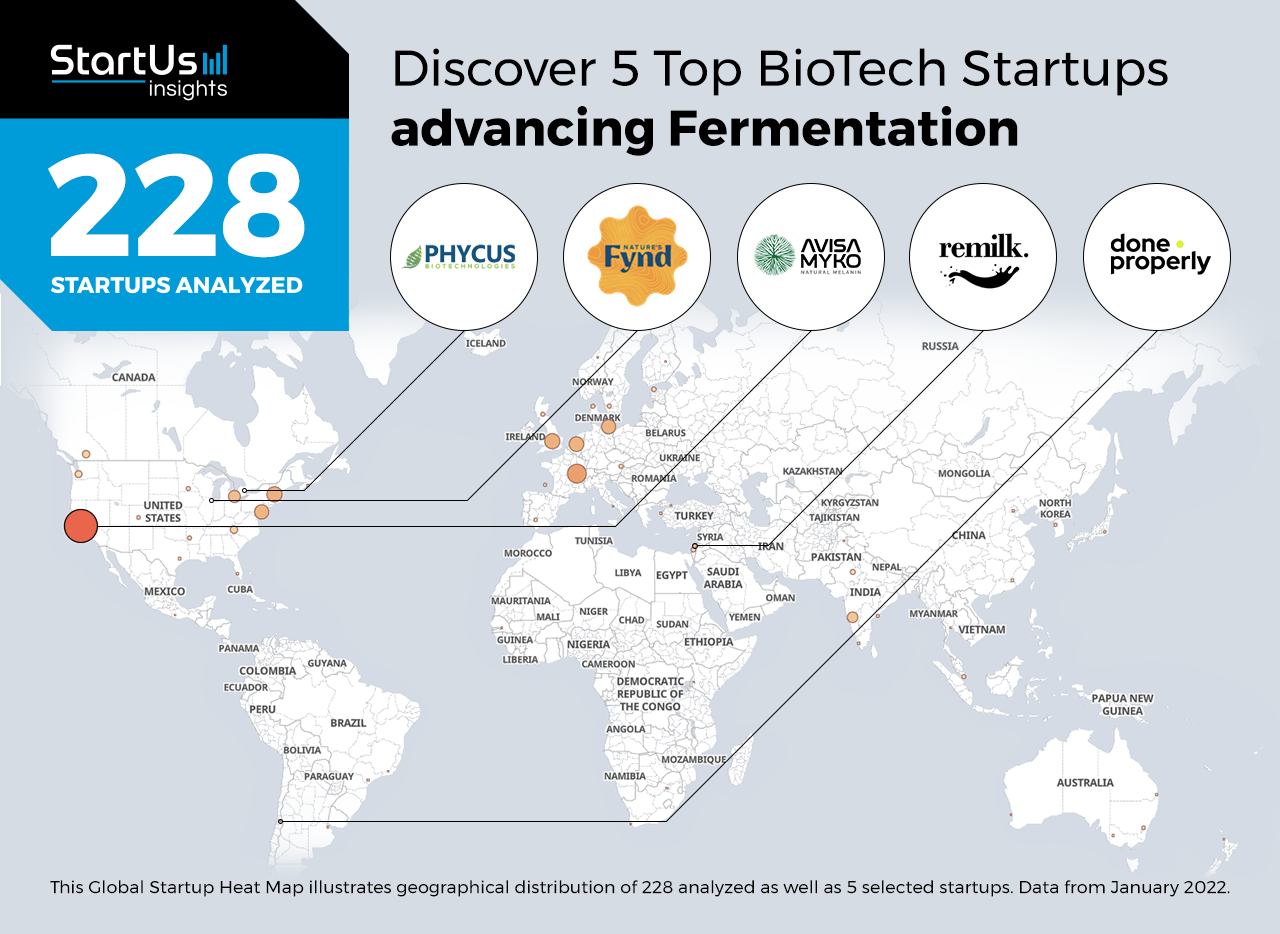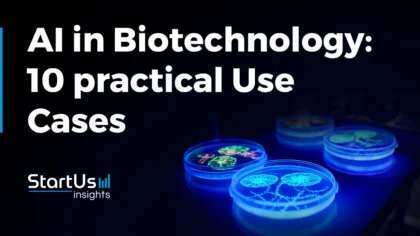Staying ahead of the technology curve means strengthening your competitive advantage. That is why we give you data-driven innovation insights into the BioTech industry. This time, you get to discover five hand-picked Biotech startups advancing fermentation.
Out of 228, the Global Startup Heat Map highlights 5 Top BioTech Startups advancing Fermentation
The insights of this data-driven analysis are derived from the Big Data and Artificial Intelligence (AI)-powered StartUs Insights Discovery Platform, covering 2 093 000+ startups and scaleups globally. The platform gives you an exhaustive overview of emerging technologies and relevant startups within a specific field in just a few clicks.
The Global Startup Heat Map below reveals the distribution of the 228 exemplary startups and scaleups we analyzed for this research. Further, it highlights five BioTech startups that we hand-picked based on criteria such as founding year, location, funding raised, and more. You get to explore the solutions of these five startups and scaleups in this report. For insights on the other 223 fermentation solutions from BioTech startups, get in touch with us.
Nature’s Fynd provides Alternative Proteins
Founding Year: 2016
Location: Chicago, USA
Funding: USD 33 M
Partner with the startup for Mycoprotein
Nature’s Fynd is a US-based startup that creates a fungi-based protein. The startup cultivates its Fy mycoprotein using a liquid-air interface fermentation technology. It uses a fraction of the resources required by traditional agriculture as well as releases low CO2 and no methane. After streaming, pressing, rinsing, and slicing, the startup converts the final product into solid, liquid, or powder form. Nature’s Fynd’s solution has a low carbon footprint and provides a vegan, nutritious, and sustainable protein source.
Avisa Myko produces Eumelanin
Founding Year: 2019
Location: San Francisco, USA
Funding: USD 200 000
Innovate with Avisa Myko for Soluble Melanin Alternative
Avisa Myko is a US-based startup that employs fermentation technology to produce melanin. The startup’s solution produces melanin in a dissolved state followed by high-purity extraction. The resulting material enables natural soluble melanin for applications in the manufacturing of laminated plastic sheets and glass, latex products, fabrics, and cosmetics, among others.
Remilk offers Dairy Alternatives
Founding Year: 2019
Location: Tel Aviv, Israel
Funding: USD 11 M
Use this solution for Lactose-free Dairy Alternative
Israeli startup Remilk provides craft dairy identical to traditional dairy. The startup uses microbial fermentation to produce proteins identical to those found in cow milk with fewer resources. The proteins are reproduced in a tank and are free from cholesterol, lactose, hormones, and antibiotics. This provides consumers with a sustainable source of protein and mitigates the issue of lactose intolerance.
Done Properly offers Alternative Flavors
Founding Year: 2019
Location: Macul, Chile
Partner with Done Properly for a Sustainable Protein Alternative
Done Properly is a Chilean startup that offers alternative flavors and protein sources using its fermentation process. The startup’s RISE, an ingredient based on umami molecules, functions as a natural flavoring condiment. This enables sodium reduction in flavorings and enhances the natural taste of the food. Another solution by the startup, MICO, is a mycelium-based protein. These solutions contain high protein and fiber as well as are sustainable alternatives to artificial flavors in the food industry.
Phycus Biotechnologies provides Sustainable Glycolic Acid
Founding Year: 2017
Location: Toronto, Canada
Funding: USD 73 500
Partner with Phycus Biotechnologies for Biome-friendly Cosmetics
Canadian startup Phycus Biotechnologies produces formaldehyde-free glycolic acid. The startup’s solution, Purolic Acid, is a biobased glycolic acid derived from sugar feedstock and atmospheric CO2. The solution uses a bio-conversion platform that converts CO2 and diverts GHG emissions from large-scale emitters. It is free of contaminants, such as formaldehyde, found in conventional manufacturing processes. This provides cosmetics manufacturers with a natural biome-friendly alternative to glycolic acid and reduces their carbon footprint.
Discover more BioTech Startups
BioTech startups such as the examples highlighted in this report focus on alternative protein sources, dairy alternatives, bioprocessing, and advanced fermentation processes. While all of these technologies play a major role in advancing the industry, they only represent the tip of the iceberg. To explore BioTech technologies in more detail, simply let us look into your areas of interest. For a more general overview, download our free BioTech Innovation Report to save your time and improve strategic decision-making.









